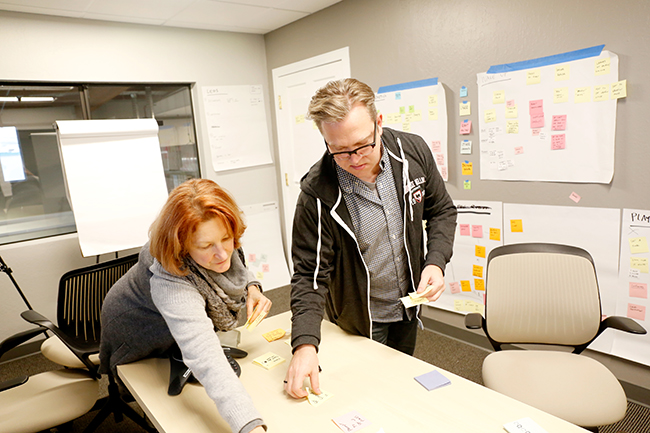- Published on
I’m a designer and writer living in San Francisco. Currently, I’m VP of Product at Mayfield Robotics, a robotics startup making an adorable home robot. I head up design, brand, marketing, research, and product management efforts—meaning pretty much anything that isn’t running the business or engineering. I oversee how the robot looks, sounds, and acts, as well as the ecosystem and touchpoints around the robot: website, packaging, the app, accessories, etc.
Do you think that courses and workshops on UX design can significantly improve one’s skillset?
I definitely think they do. It’s pretty easy to get caught up in the day-to-day work of what we do and miss larger trends or new ways of doing work. Many us, particularly if you work in technology, work in fast paced industries where there is a lot of change. Courses and workshops allow us to step back and reflect on our process and hopefully add new tools for doing the work or thinking the work—ideally both. I’ve gotten great value from workshops and conferences. Years ago, you had to go to design school to get the kind of training you can get at conferences these days. (Although there is no substitute for design school for a deep immersion.)
What’s your target audience?
The target audience for my own workshops and talks are usually a broad swath of people from across the product design spectrum. I get mostly UX Designers, but also product and project managers, developers, and manager/director types. Most of what I talk about is often a way of approaching the work.
What prototyping tools do you use in UX design? Do you vary techniques and tools or have a basic set suitable for your everyday tasks?
We use pretty much everything in our daily work, from old standbys like Illustrator and Photoshop, to newer tools like Sketch to home-grown tools for putting animations on the robot. In my own work, I do a lot of “design” work in non-design tools like Excel. I know: I’m just as surprised as you are. I’m also blessed with having two whiteboards in my office and those are easily the tools I use the most, aside from email and Slack. We also keep an internal Wiki to keep track of the design decisions that get made, so we can always reference them and engineers can always look them up independently.

What books on UX are a must for every designer?
The Design of Everyday Things is still the primer. I’d choose that over pretty much any straight up UX book for explaining what we do and why it matters, because now, apps and devices are those “everyday things". That being said, there’s a lot of great books out there. Just a sample:
- 79 Short Essays on Design, Michael Bierut
- The Humane Interface, Jef Raskin
- Designing for People, Henry Dreyfuss
- Universal Principles of Design, William Lidwell
- Designing Products People Love, Scott Hurff
- What Things Do, Peter-Paul Verbeek
But honestly, I also recommend every designer read fiction as well, especially historical fiction and science fiction. You want to be able to see the world through different viewpoints and be able to comprehend different outcomes, and fiction is great for that.
Where do you draw your creative energy from?
I honestly have no idea where my creative energy comes from. I read a lot, take walks, think about things for a long time, try to see a problem from multiple angles, and don’t try to fall in love with any one solution, in case it proves untenable. But I have no idea where ideas from or how they stick. Or, more precisely, I get them from lots of places: an overheard conversation, seeing something on Twitter or in a shop window, traveling, going to an art museum, hearing something on a podcast, reading an article. If I’m lucky, I’ll write it down in a notebook or save it to Evernote or scrawl it on the whiteboard so it doesn’t get lost. After which, I mull it over. And occasionally, just occasionally, it’s an idea with legs.
Do you think inspiration is overrated?
I don’t think inspiration is overrated. It’s hard to have a really good idea. Teasing that idea out into something solid can be harder, but it all starts with a spark.
